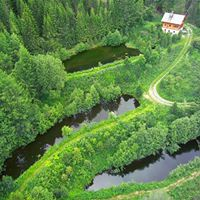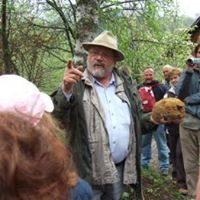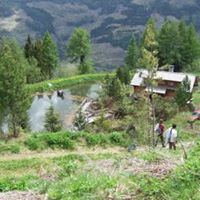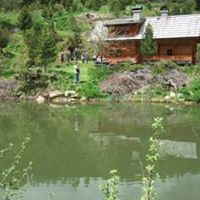@zhongdao
2020-06-18T08:24:53.000000Z
字数 21894
阅读 3101
朴门永续:对Sepp Holzer的访问印象
未分类
原文链接
https://www.facebook.com/pg/ringingcedarsofrussia/photos/?tab=album&album_id=1011487418864891
机器翻译,有一定错误,有意愿的人可以随意修订翻译和重新发布。
中文译文
永久性:对Sepp Holzer的访问印象
5张照片·
对Sepp Holzer的访问给我留下了深刻的印象:
http://www.ringingcedarsofrussia.org/ringing_cedars_newspaper_the_earth_signup.php
致所有问候,亲爱的朋友们!我到奥地利的旅程和Sepp Holzer的农场都结束了。您无法写出调度中的所有内容,因为有很多信息(视频长达17小时),所以我将尽力阐述要点。我们的团队由25人组成,主要是乌克兰地区有机农业俱乐部的负责人。
在Holzer,我们有来自德国的两个家庭,一个来自波兰的家庭和一个来自匈牙利的家庭。我们从乌日哥罗德乘公共汽车经过斯洛伐克,感到惊讶的是,无论是在斯洛伐克还是在奥地利,都没有看到任何垃圾,人们感到人们意识到了对后代的责任。
对我来说,这是一个发现,斯洛伐克是一个多山的国家,到处都是美丽的风景,整齐的院子和常绿的树篱,美丽的岩石花园,覆盖着花板的房屋,许多干净的山区河流和溪流。在斯洛伐克和奥地利,几乎每个人迹罕至的山上都有一座城堡,山谷中有许多田野,就像童话中的《穿靴子的少女》一样:“这些田野是谁的?” “卡拉巴斯-巴拉巴斯。” 在斯洛伐克,许多田地被播种,而在奥地利,令人惊讶的是罂粟(红色和紫色)。斯洛伐克和奥地利之间没有边界-这是申根区。
进入奥地利时,我们注意到风力涡轮机的整个“种植园”-他们正在保存其资源。水的质量令人惊喜。由于其中一位旅行团成员感到恐惧,欧洲的水质不好,我们带来了七瓶五升的水,然后把它们带回了几乎没碰过的地方。在回来的路上,我们带来了所有的容器,其中我们从阿尔卑斯山酒店附近山间溪流融化的雪中收集了最美味的淡水。
从斯洛伐克到目的地的整条路都沿途延伸了100到500个农舍的小型定居点,里面有一层和两层楼的房屋,但整条路上都没有人,几乎也没有汽车。但是另一方面,我们看到鹿和野鸡在四处游荡,兔子有时会跑来跑去,白色的天鹅,鸭子和鹅在湖水和河流中游动。我们开车去维也纳两个小时。说实话,这个大城市并没有给我们留下任何印象。和其他城市一样,监狱都熙熙bus,人山人海,我们真的很累。
我们在离霍尔泽(Holzer)农场四公里处的私人寄宿处停了下来,海拔1800米。令我们惊讶的是,现场仍然积雪,植被刚刚开始开花。尽管如此,每天早晨,硬化的乌克兰“北极熊”沐浴在冰冷的高山湖泊中,激起了旅馆业主的敬佩之风。三辆小巴出租车将我们带回了霍尔泽。终于,现在,我们来到了期待已久的天堂之门。与土地所有者的会面是热烈而愉快的。
在海拔高于海豹高度1100至1500米的霍尔泽(Holzer),杜鹃花,其他许多花已经灌木丛和果树都盛开了,所有这些的年平均气温为+ 4C。这一切都归功于他利用湖泊,岩石和高脊系统创建的微气候,该系统由树干和树枝组成,上面覆盖着从沟渠(宽度为挖掘机的铲斗,深度为0.5至1米,长度任意)中取出的土。这些就是所谓的heat traps热捕获井。
因此,我从霍尔泽(Holzer)的讲话中得出的第一点也是最重要的一点是,在恢复自然景观时,必须为该地区提供开放的水源。他说到处都有水,只有一个人必须学会找到它。起初,他邀请了专业的找水专家,但随着时间的流逝,他自己掌握了这项技能。
第二件事是通过形成树篱和高高的山脊来保护包裹免受吹来的风的影响。
第三,创造各种动植物生活(包括有毒植物)。由于他认为木蚂蚁是森林的治愈者,因此他从整个周边将成麻袋的木蚂蚁(sacks of wood ants)拖到他的包裹中。正如他所表达的那样,霍尔泽正在创造“可食用”的森林,在这里,果树和灌木丛与针叶,落叶和装饰性植物共生。他认为,地球的未来取决于这些类型的森林,因为除了生产空气和更新土壤外,它们还将能够消除饥饿问题。
编者注:木蚂蚁维基百科:
https://en.wikipedia.org/wiki/Carpenter_ant
第四,一块土地的面积越大,工作量就越少。Holzer不再需要做任何事情,并且由于自然的慷慨,该领域的收入将自发增长。十年前种植的每种植物的价值增长了一百倍(有时甚至是一千倍),而且,在没有人类帮助的情况下,它已经自我繁殖了许多次,从而使他的被动收入逐年增加。
第五,他的座右铭:“最少的工作量,最大的效果”。今天,他的领域是一个自给自足,自我发展的系统。未经他的同意,我无法宣讲他的年收入额,但是,相信我,这和他整个领域的总体价值一样令人印象深刻。他以树苗,植物种子,鱼类,小龙虾,蘑菇,坚果,水果,浆果和蔬菜的销售为生,现在还举办研讨会。而且,他不会为收获而烦恼。另一方面,有足够的人愿意收集有益健康,生态纯净的农作物,并且为此付出的费用要比通常的商业网络多18到20倍。
第六,尽量在最大程度上利用种子种植所有植物,事先创造接近自然条件的条件:在冷冻室或雪地里分层。他这样种了非常多的树,给我们看了最精彩的15年的杉树从种子长出来。他的土地上生长着一片雪松林(西伯利亚雪松和其他一些类型的雪松,它的坚果要大得多)。对了,我送了他一个雪松籽筒,让他真心高兴。
He recommended planting seedlings in poor soil, under no circumstances in humus, since plants grown in more favourable conditions find it more difficult to adapt to a natural environment and fall sick.
他建议在土壤贫瘠的地方种苗,在任何情况下都不要用腐殖土,因为在较有利的条件下生长的植物更难适应自然环境而生病。
第七,不要修剪果树。他认为这是不必要的工作,而且他不喜欢做不必要的工作。此外,他们习惯了这种程序,变得依赖于人为干预,变得虚弱无力。他只在树木病的情况下修剪。
第八,移栽时不要浇水,要把树种在最贫瘠的土壤里,不施肥。霍尔泽用一种有趣的方法移植成年落叶树和灌木:他把挖出的植物根部用麻袋包裹起来,湿润根部,使其不至于干枯,放在阴凉处,并把树冠放在阳光下,当树的叶子脱落后,就可以进行种植了。它们百分之百地生根发芽。
第九,最大程度地利用动物的能力来帮助耕种。因此,他利用猪的能力挖土来准备种植床,把他最喜欢的豌豆和玉米撒在他需要的地方。
第十,不要盲目抄袭任何人,包括他。用自己的头脑去思考和观察大自然。他的话。"我的大学就是大自然" 他所有的经验都是来自于大自然。他非常经常地重复说:"人类不可能完善已经很完美的东西,我们只需要学会明智地管理自然。"
为此,当植物、动物或土壤出现问题时,他就进入这个存在的状态,想象自己是它,并倾听自己的感受,在这个地方是否舒服,有什么烦恼,有什么不足,有什么想要的。答案就来了,而且非常重要的是--它总是正确的。而如果诊断正确,那么治疗就会有效果。
霍尔泽还深信每个人都有权拥有一块土地,一个至关重要的空间,只有与自然和谐相处,世界才能变得更好,并且我们的病态社会的所有社会问题都将得到解决。
现在,他已经在他自己的国家和其他国家得到认可。他被邀请在许多大学演讲。奥地利的学术精英们围绕霍尔泽的思想进行了统一,并以他的名字并在接受采访的基础上草拟了一份文件,呼吁世界各国政府和地球上的居民提出有关如何克服了生态和经济危机。
霍尔泽(Holzer)被邀请到一些国家来更新正在退化的环境,这要归功于人类不明智的活动。
目前,他正在参与20个此类项目。这些都是社会产品,他常常自己出资,并用自己的树苗和种子进行退化地区的恢复。他谈到了他在祖国格拉茨市实施的一项有趣的社会项目。他在一个寄宿房里为残疾人提供了一个永久的小花园,让他们可以坐轮椅。他帮助制作了高高的植物床,以便残疾人可以直接坐在轮椅上照料他们,播下种子并收割庄稼。这个项目的效果是惊人的。人们的生活状态发生了根本变化,他们对生活产生了兴趣,并通过独立地为自己提供食物产品并与上帝的活物进行了交流而意识到了自己的意义。
他对自己的项目说了很多,但您可以在他的《叛军农民:塞普·霍尔泽》一书中阅读这些内容。
让我们回到我们的研讨会。研讨会的第一天完全由Sepp亲自主持。第二天,他27岁的儿子和继任者约瑟夫(Josef)介入其中。约瑟夫是一个聪明善良的年轻人,给我们留下了很好的印象。我认为他也喜欢我们,因为我们对他们的家庭经历表现出了浓厚的兴趣,并深深地钻研了琐事,并且他非常愿意讨论所有细节。确实,在规划和创建其领域的任何功能时,这些人都认真地考虑了所有事情,以至于无所适从。最主要的是,手头的材料无处不在,财务和人工支出最少。
我还必须谈到霍尔泽(妻子)的维罗妮卡(Veronika)。我们几乎从未见过她。但是,我们品尝了她无形活动的成果。晚餐时,她为我们提供了烹饪艺术的杰作:用“俄罗斯草”制成的他们自己制作的粗面粉水果蛋糕。到底是什么,我至今仍不知道。Sepp解释说这是一种原始草,无论是单核还是两核。至少,它的种子装在一个装有种子混合物的小包装中,并分发给研讨会的所有参与者。这种草可能是多年生的,如果被割草并且不允许形成耳朵,则叶片与普通草毫无区别。我将其播种,在自己的包裹上种下,然后与他人分享。好吧,我不得不承认,尽管我现在是个吃奶酪的人,我并没有否认自己品尝Veronika制作的烹饪新颖菜的乐趣。...而且我确认,一切都很好,非常美味!我们还接受了来自高山草丛中最芳香的自制茶,由白老制成的利口酒的处理,第二天,我们完全制得了无糖的苹果格瓦斯,令人agger舌。顺便说一句,用茶我们可以选择白色或棕色的未精制糖。在酒店也应注意。好吧,我也决定与众不同,并感谢女主人的努力,决定让她的工作在晚餐后更容易打扫房间-我让人们搬走,自己洗碗,并清理面包屑。桌子,引起了Veronika相当可观但令人惊讶的惊奇。
时间无休止,我们在这个高山伊甸园的住宿即将结束。那天是阳光明媚的日子,我们在健康的高山自然风光中变暖,被充满鲜花和松针气味的敏锐的山间空气所陶醉,并因我们主人的热情好客而感到陶醉。我们不想离开这个地方去其他任何地方,我们想无限地延长与志同道合的人互动的乐趣。但是离别的时刻到了。年轻的霍尔泽(Holzer)得到了一些Fokin耕种机,这些耕种机是由Yura Goncharuk(基辅)和Dima Pelykh(这次旅行的组织者)运到边境的。在耕种机上进行了大师班授课。然后有很多约瑟夫的照片,这些书作者的亲笔签名,与研讨会的其他参与者交换名片和地址。
如果Sepp不必第二天去某所大学的下一次演讲,我们可能会坐到凌晨几小时。我们不可避免地不得不说再见。在合唱团中,我们演唱了乌克兰歌曲:“健康,健康生活,我们要回家去我们的小木屋。” 主人和客人们都很高兴,我们分开了。
那天晚上,在酒店的一个德国小组的妇女走近了我们。原来,她是Anastasia的追随者,在柏林她从事计算机技术的部署工作。再有一连串的喜悦和情感,地址的交换!事实证明,在整个研讨会期间,已有17万德国人访问了Holzer's。
我还必须向您介绍霍尔泽(Holzer)的书的出版商及其俄语译者的家庭。他们是俄罗斯德国人爱德华(Edward)和安吉利卡·斯切克(Angelika Scheck)以及他们的四个孩子。爱德华也曾在我们的研讨会上担任口译员。这个家庭很有趣。孩子们是建立祖传家园定居点的支持者。在德国,他们暂时购买了一块土地,用于一个家园的土地,当时是50公顷(一公顷是一百公顷),但他们计划将其扩大到至少一公顷。他们已经认识Holzer很久了,他们是最早将影片《阿尔卑斯山的永续耕种》带到俄罗斯并将其翻译成俄语的人。
他们也在自己的土地上使用永续耕种方法。现在他们在挖湖。Angelika与我们分享了她在合理农业方面的一些经验。因此,
例如,她以以下方式种植土豆:由于在湖中挖掘获得了很多土壤,安吉莉卡将土豆直接放在平坦的草地上,并用一桶土覆盖。她在这个小丘上转了一圈,种植了大约五灌木丛草莓,中间可以粘几粒玉米。当它们成熟时,土豆出来了,而草莓继续生长。
此外,安妮莉卡(Angelika)在一个产妇之家的头两个孩子的分娩中遭受了很大的痛苦,并且经历了八次手术,在丈夫的支持下,她自己的下一个两个孩子的分娩。现在,她教其他家庭为家庭分娩做准备。她接到来自德国各个角落的电话,并在全国各地旅行,以帮助他们在正常情况下轻松无障碍地出现在世界上。
Angelika梦想着参观基辅-佩乔尔斯基修道院,我邀请他们所有人参观我,包括参观卢布斯科,并告诉他们我的梦想是根据“定居者学校”的计划在卢布斯科举办研讨会。Angelika回答说,她将能够组织这些研讨会的游览,事实证明,德国有很多人想参加这种培训。
这个家族正在研究Holzer的第二本书的翻译,该书提供了有关永生栽培方法的更详细描述。我们在奥地利的最后一个晚上结束了会议,我们对在研讨会上的住宿进行了回顾。小组成员聚集在Goncharuks和Podolkhovs的酒店房间里,每个想要的人都分享了自己的印象。赫尔森(Kherson)的迪玛(Dima)和安雅·佩利赫(Anya Pelykh)表示了极大的感谢,他们使我们感动并严格意义上组织了这次旅行。
返回乌日哥罗德后,迪马进行了“抽气”程序,该程序记录在视频和照片中。在会议上,有机农业俱乐部运动的创始人彼得·特罗菲缅科(Petr Trofimenko)的话特别感动我。彼得表示,现在是扩大有机农业俱乐部活动范围的时候了,随着俱乐部的创建,有必要支持运动的积极分子人民的倡议,以建立实用的教育。以他们的农庄为中心 每个感兴趣的人,连同理论一起,也可以获得实践技能。彼得用语言表达了自己的想法。我和大家分享了我不久的将来的计划。由于建立这种类型的实践教育中心的先决条件很早就已经在我位于卢布斯科的位置创建了,所以我计划在今年6月认真进行此事项的正式化。Petr Trofimenko和Yura Goncharuk答应支持我的倡议。我们谈话的成果已经很明显:从下个星期到夏天结束,我一直在做轮班工作(每隔第二个星期),将更多时间花在Lubskoe上,并通过建立一个过渡到自给自足的方式我住所所在地的基辅俱乐部分支机构(基辅每周三天,卢布斯科(Lubskoe)四天)。
自然,独自承担这种事务很复杂,因此我正在寻找同伴!!!顺便说一句,尚未成为有机农业俱乐部会员的人现在都可以通过我注册并订购该俱乐部的产品。这是我拜访一个了不起的人的旅程已经结束的了不起的方式!!!在不久的将来,我将尽力完成对照片的处理,并请亚科夫(Yakov)将其放在我们的网站上。我想提醒所有尚未填写调查表的人,所有这一切仍然是最新的,请您即使是草稿也将其发送给我。今天就这些。
最好的祝愿,Oksana Inte oki05@ua.fm自然农业实践教育中心,2008年6月6日该材料由Byt Dobru报纸发送,
http://gazeta.bytdobru.info
照片





英文原文
PERMACULTURE: Impressions from the visit to Sepp Holzer相册PERMACULTURE: Impressions from the visit to Sepp Holzer
5张照片 · Updated 4年前
PERMACULTURE: Impressions from the visit to Sepp Holzer Read more at: http://www.ringingcedarsofrussia.org/ringing_cedars_newspaper_the_earth_signup.php Greetings to all, dear friends! My trip to Austria and the farm of Sepp Holzer is over. You cannot write about everything in a dispatch because there was a lot of information (17 hours of video), so I shall try to set out the main points. Our group consisted of 25 persons-basically the leaders of regional Organic Farming Clubs from Ukraine, at Holzer's we were joined by two families from Germany, one from Poland, and one from Hungary. We travelled by bus from Uzhgorod through Slovakia, we were amazed not to see garbage anywhere in either Slovakia or Austria, one felt that the people realize their responsibility to their descendants. For me it was a discovery that Slovakia is a mountainous country, all around were beautiful landscapes, well-kept yards with evergreen hedges, beautiful rock gardens, houses covered with flowered plates, many clean mountain rivers and streams. Both in Slovakia and Austria there was a castle on practically each inaccessible mountain, and in the valley were fields, like in the fairytale Puss in Boots: "Whose fields are these?" "Karabas-Barabas." In Slovakia many fields are sown with rape, and in Austria, surprisingly, with poppies (red and purple). There is no border between Slovakia and Austria-this is the Schengen zone. On entering Austria we noticed entire "plantations" of wind turbines-they are conserving their resources. The quality of the water was a pleasant surprise. Frightened by one of the tour members that the water in Europe is bad, we brought with us seven five-litre bottles of water and...brought them back almost untouched. On the way back we brought with us all our containers in which we had collected the most delicious fresh water from melted snow from the mountain stream near our hotel in the Alps. Along the roads for the entire route from Slovakia to our destination stretched small settlements of 100 to 500 farmsteads with one- and two-story houses, but we saw no people along the entire road, almost no cars either. But on the other hand, we saw deer and pheasants freely roaming around, rabbits would sometimes run by, white swans, ducks, and geese were swimming on the lakes and rivers. We drove into Vienna for two hours. To tell the truth, the large city did not make an impression on us. The same prisons as in any other city, hustle and bustle, and crowds of people, of which we had really become tired. We stopped in a private boarding house four kilometres from Holzer's farmstead at an elevation of 1800 metres above sea level. To our surprise, there was still snow in spots, the vegetation had just started to bloom. In spite of this, every morning the hardened Ukrainian "polar bears" bathed in the icy mountain lake, which provoked a storm of admiration from the owners of the hotel. Three microbus taxis took us to and from Holzer's. An now, finally, here we were before the gates of the long-awaited paradise. The meeting with the owner of the domain was warm and joyful. At Holzer's, at an elevation of 1100 to 1500 metres above seal level, already the rhododendrons, a multitude of other flowers, and fruit bushes and trees were in full bloom, and all this with an average annual temperature of +4C. All this is thanks to a microclimate, which he created using a system of lakes, rocks, and high ridges, which consist of the trunks and branches of trees, covered with earth taken out of a trench (with a width of the bucket of an excavator, a depth of 0.5 to 1 metre, and arbitrary length). These are the so-called heat traps.
So the first and most important thing I took from Holzer's remarks was that, when restoring a natural landscape, you must provide the area with an open source of water. He said that there is water everywhere, one only must learn to find it. At first he invited specialist water-dowsers, but with time he mastered this skill himself.
The second thing is to shield the parcel from the blowing wind by creating a hedge and high ridges.
Third, create a variety of plant and animal life (including poisonous plants). From the entire neighborhood he dragged sacks of wood ants to his parcel, since he considers them to be the healers of the forest. Holzer is creating, as he expresses it, "edible" forests, where fruit trees and bushes grow in symbiosis with coniferous, deciduous, and decorative plants. He believes that the future of the planet depends on these types of forests, since apart from producing air and renewing the soil, they will be able to eliminate the problem of hunger.
Fourth, the greater in size the parcel of land, the less work there is. Holzer no longer has to do anything, and the income from the domain will grow spontaneously, because nature is generous. The value of each plant planted ten years ago has grown a hundred-fold (and sometimes a thousand-fold), once, moreover, it has reproduced itself many times without the help of man, augmenting his passive income yearly in increasing progression. Fifth, his motto: "minimum work, maximum effect." Today his domain is a self-sufficient, self-developing system. I cannot parade the amount of his annual income without his consent, but, believe me, it is impressive, as is the general value of his entire domain. He lives off the sale of saplings, plant seeds, fish, crawfish, mushrooms, nuts, fruits, berries, and vegetables, and now seminars as well. What's more he does not trouble himself with gathering the harvest. On the other hand, there are enough people willing to gather wholesome, ecologically pure crops, and in doing so to pay 18 to 20 times more for the products than in the usual commercial network. Sixth, try to the maximum extent to plant all plants using seeds, creating beforehand conditions close to natural conditions: stratification in a freezer or snow. He planted very many trees this way, showed us the most wonderful 15-year-old fir grown from a seed. A cedar forest is growing on his land (Siberian cedars and some other type of cedar, which has much larger nuts). By the way, I gave him a cedar seed cone, which made him sincerely happy. He recommended planting seedlings in poor soil, under no circumstances in humus, since plants grown in more favourable conditions find it more difficult to adapt to a natural environment and fall sick. Seventh, do not trim fruit trees. He believes that this is unnecessary work, and he does not like to do unnecessary work. In addition, they get accustomed to this procedure and become dependent on the intervention of man, become weak and less vigorous. He only trims in the case of a tree disease. Eighth, do not water the trees when transplanting, plant them in the poorest soil with no fertilizers. Holzer uses an interesting method for transplanting adult deciduous trees and bushes: he wraps the roots of the dug-up plant in sacking, moistens the roots so they will not dry out, leaves them in the shade, and places the crown in the sun, when the tree loses its foliage, it is ready for planting. They take root one hundred percent of the time. Ninth, make maximum use of the abilities of animals to help in the farming. Thus, he uses the ability of pigs to dig up the earth in order to prepare beds for planting, scattering their favourite peas and corn on the area he needs. Tenth, do not copy anyone blindly, including him. Use your own head to think and observe nature. His words: "My university is nature." All his experience is taken from nature. He very often repeats, "Man cannot perfect that which is already perfect, we must simply learn to manage nature wisely." For that reason, when a problem arises with the plants, animals, or soil, he enters into the state of this being, imagines being it, and listens to his feelings, whether he is comfortable in this spot, what is bothering him, what is lacking, what he would like. And the answer comes, and what is very important-it is always right. And if the diagnosis is made correctly, then the treatment will be effective. Holzer is also convinced that each person has the right to a parcel of land, a vital space, and that only by living in harmony with nature can the world be changed for the better and all social problems of our sick society be solved. Now he has been recognized both in his own country and others. He is invited to lecture at many universities. The academic elite of Austria has united around Holzer's ideas and, in his name and on the basis of his interviews, has drawn up a document-an appeal to the governments of the countries of the world and the inhabitants of our planet with proposals how to surmount the ecological and economic crisis. Holzer is invited to countries to renew environments that are being degraded "thanks to" the unwise activities of man. At this time, he is participating in twenty such projects. These are all social products, often he also finances them himself and carries out the restoration of the degraded areas using his own saplings and seeds. He talked about an interesting social project that he implemented in the city of Graz in his homeland. He created a small permaculture garden at a boarding house for disabled persons who get around on wheelchairs. He helped make high plant beds so the disabled could care for them directly from their wheelchairs, sow the seeds and gather the crops. The effect of this project was staggering. There was a fundamental change in the psychological states of the persons, who experienced an interest in life and had a sense of their own significance by independently providing themselves with food products and communicating with the living creations of God. He spoke a great deal more about his projects, but you can read about them in his book, The Rebel Farmer: Sepp Holzer. Let us return to our seminar. The first day the seminar was conducted completely by Sepp himself. The next day Josef, his 27-year old son and successor, became involved. A bright and kind young man, Josef made a very good impression on us. I think he also liked us, since we displayed a lively interest in their family experience and got to the bottom of the smallest trifles, and he discussed it in all its details with great willingness. And truly, in the planning and creation of any feature of their domain, these people thought through everything so competently that there was nothing to cavil at. The main thing is that the materials at hand were used everywhere, with minimal financial and labour expenditures. I must also speak about Veronika, Holzer's wife. We almost never saw her. But we savoured the fruits of her invisible activity. For dinner she served us masterpieces of the culinary art: fruit-cakes of coarse flour of their own making, produced from "Russian grass," as they call it. Just what this was, I do not know to this day. Sepp explained that this is an original grass, either one-kernel or two-kernel. Its seeds, at least, are in a small package with a seed mixture that he distributed to all the participants in the seminar. This grass may be perennial, if it is mowed and not allowed to form ears, the blades are in no way distinguishable from ordinary grass. I shall sow it, grow it on my parcel, then I shall share it with others. Well, I have to confess, that in spite of the fact that I am now a cheese-eater, I did not deny myself the pleasure of tasting the culinary novelties prepared by Veronika.... And I confirm that everything was, well, verrry delicious! We were also treated to the most aromatic home-made tea from alpine grasses, a liqueur made from white elder, and the next day the completely staggering taste of apple kvass prepared without sugar. By the way, with tea we were served the choice of white or brown, unrefined sugar. At the hotel too, it should be noted. Well, I also decided to distinguish myself, and in gratitude for the efforts of our hostess, decided to make her work in cleaning up the premises after dinner easier-I got the people moving, washed all the dishes myself and cleaned the crumbs off the table, which elicited the considerable, but pleased amazement of Veronika. Time is inexorable, and our stay in this alpine Eden was drawing to a close. That day was sunny, we warmed ourselves among the wholesome unruliness of alpine nature, intoxicated by the keen mountain air filled with the scent of flowers and pine needles, enchanted by the hospitality and kindness of our hosts. And we did not want to leave this place to go anywhere else, we wanted to prolong the joy of interacting with like-minded persons endlessly. But the moment of parting came nevertheless. The young Holzer was given some Fokin cultivators, which had been smuggled across the border by Yura Goncharuk (Kiev) and Dima Pelykh (Kherson-the organizer of the trip). A master class in working with the cultivator was given. Then there were many photographs with Josef, autographs from the author of the books, exchanges of business card and addresses with other participants in the seminar. We probably would have sat up until the wee small hours if Sepp did not have to go the following day to his next lecture at some university. We inevitably had to say our goodbyes. In chorus we sang the Ukrainian song "Be healthy, live well, we are setting off for home, to our little hut." Mutually pleased, both hosts and guests, we parted. That evening at the hotel a woman from the German group approached us. It turned out that she was a follower of Anastasia, in Berlin she works in the deployment of computer technologies. And again there was a flurry of delight and emotions, an exchange of addresses! It turned out that over the entire period of putting on seminars, 170 thousand Germans have already visited Holzer's. I must also tell you about the family that are the publishers of Holzer's book and its translators into Russian. They are the Russian Germans Edward and Angelika Scheck, and four of their children. Edward had been the interpreter at our seminar as well. The family is very interesting. The children are supporters of the idea of the creation of kin's settlements. In Germany they bought a parcel of land for a kin's domain, 50 ares (an are is one-hundredth of a hectare) for the time being, but they plan to enlarge this to at least a hectare. They have been acquainted with Holzer for a long time, they were the ones who first brought the film Permaculture in the Alps to Russia and translated it into Russian. They use permaculture methods on their own land as well. Now they are digging a lake. Angelika shared with us some of her experience in rational farming. So, for example, she plants potatoes in the following manner: since a lot of earth is being obtained in digging the lake, Angelika places the potatoes directly on the flattened grass and covers it with a bucket of earth. On this little mound in a circle she plants about five bushes of strawberries, in the middle it is possible to stick a couple of kernels of corn. When they are ripe, the potatoes come out, while the strawberries continue to grow. In addition, having experienced much suffering in the birth of her first two children at a maternity home and having undergone eight operations, Angelika, with the support of her husband, gave birth to her next two children on her own at home. Now she teaches and prepares other families for home birth. She receives calls from all corners of Germany, and she travels throughout the country to help with the appearance of a new person in the world painlessly and in normal conditions. Angelika dreams of visiting the Kiev-Pechersky Monastery, and I invited all of them to visit me, including a visit to Lubskoe, and told them of my dream to conduct seminars in Lubskoe according to the programme of the "Settler's school." Angelika answered that she would be able to organize tours for these seminars, it turns out that there are many people in Germany who would like to take this type of training. This family is now working on the translation of Holzer's second book, which provides a more detailed description of permaculture methods. Our last evening in Austria concluded with a session where we reflected back on our stay at the seminar. The group gathered in the Goncharuks' and Podolkhovs' hotel room, and each person who so desired shared their impressions. Much gratitude was expressed to Dima and Anya Pelykh from Kherson, who got us moving and, strictly speaking, organized the trip. After his return to Uzhgorod, Dima underwent a "pumping" procedure, which was documented on video and in photographs. At the session, I was especially touched by the words of Petr Trofimenko, the founder of the Organic Farming Club movement. Petr said that the time had come to broaden the functions in the activities of the Organic Farming Clubs and, together with the creation of clubs, it was necessary to support the initiatives of people, active members of the movement, in their creation of practical educational centres on the basis of their farmsteads, where each interested person, together with theory, could obtain practical skills as well. Petr put my own thoughts into words. And I shared my plans for the near future with everyone. Since the prerequisites for the founding of this type of practical educational centre had already long ago been created at my place in Lubskoe, I was planning in June of this year to go through with the formalization of this matter in earnest. Petr Trofimenko and Yura Goncharuk promised to support my initiative. And the fruits of our talks are already evident: from the following week to the end of the summer I have been working on shifts (every second week), to spend more time in Lubskoe and to make the transition to self-sufficiency by creating a branch of the Kiev club at the place of my residence (three days a week in Kiev, four in Lubskoe). Naturally, it is complicated to undertake such an affair on my own, and so I am seeking companions!!! By the way, whoever has not yet become a member of an Organic Farming Club can now do so through me, as well as order the club's products. This is the amazing way that my trip to visit an amazing person has ended!!! In the near future I shall try to finish the processing of the photographs, and I shall ask Yakov to place them on our site. I want to remind anyone who has not yet filled out the questionnaire that all this is still current, and I ask you to send them to me, even in draft form. That's all for today. Best wishes, Oksana Inte oki05@ua.fm Natural Farming Practical Educational Centre, 6 June 2008 The material was sent by the newspaper Byt Dobru, http://gazeta.bytdobru.info
